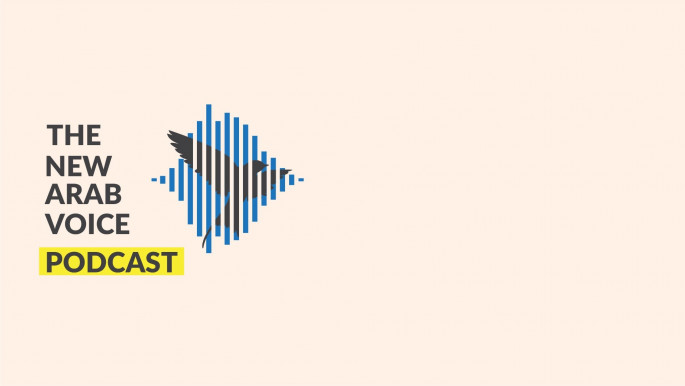This pandemic-inspired podcast is bringing the ancient world of Mesopotamia back to glorious life
During the summer of 2020, as Britain and other corners of the globe sank into lockdown, the Thin Edge of the Wedge (TEW) podcast — an Aladdin's Cave of all-things Mesopotamian — was born.
"It's basically just me," Taylor jokes, beneath my crackling phone-line, describing a one-man-led production, headquartered in his back room, managed on a shoestring budget.
The series boasts a growing audio library of episodes covering a wide gamut of subjects; kings and gods, legends and fables, deities and divine prophecies, 4,000-year old cuneiform tablets, ancient musical scores and pottery, misogyny, and much more.
Its opening theme is a song with near universal recognition in Iraq and the wider Middle East; Fog al-Nakhal — atop the palm tree — performed by Iraqi musicologist Ruba Hillawi.
Taylor speaks modestly about his feats, but the mission, inclusive at its heart, has tore open a space divorced from ivy-league universities and institutions, ceding the floor instead to experts and professionals that are less heard from.
"It's partly carefully considered, partly random," he says when asked about his guest selection criteria. He expands further, describing an iron-cast reality in which the international table of academia is reserved for scholars from the West.
His podcast eschews this, opening the floor to scholars from around the world. Iraqis in particular, owing to cyclical wars and the resulting isolation in their home country (the cradle of ancient civilisation) are too commonly sat on the fringes.
 |
Its opening theme is a song with near universal recognition in Iraq and the wider Middle East; Fog al-Nakhal performed by Iraqi musicologist Ruba Hillawi |  |
"I started as a student in the mid-90s," Taylor recalls, against the backdrop of the Gulf war, UN-imposed sanctions, and later, the 2003 [Anglo-American] Iraq invasion.
"For my entire working life, it's been really difficult for Western scholars to interact with Iraqis, especially for Iraqis to come out and take their part in the wider international scene."
He notes that these circumstances have normalised their exclusion and, to a lesser-extent, of other Middle Easterners.
"Colleagues have tried to bring Iraqis to conferences, something basic and simple," but even this, he says, "is not guaranteed. You can't just pop to the embassy," he says, describing laborious and time-costly visa application procedures.
"There are institutions in Iraq that are very active, and there's lots of expertise; real growth," he stresses, but the problem he alludes to is the absence of a sturdy-enough bridge, or pathways, connecting scholars across separate arenas.
"We particularly need to hear from the people working in the countries where the ancient cultures are from; where the archeology is," he said. "You can't have a field that doesn't include them.
Keen to open the stage but caught up in the whirlwind of high-intensity work commitments, Covid-19's unwanted arrival delivered Taylor's eureka moment.
The opportunity to slow down, look around, and more importantly, technology, were his greatest enablers, alongside the niche community of scholars and friends he had met over the past two decades.
 |
We particularly need to hear from the people working in the countries where the ancient cultures are from; where the archeology is... You can't have a field that doesn't include them |  |
The quantitative boom in virtual lectures that his Iraqi contemporaries have been organising was another inspirational nudge, encouraging Taylor's leap into the unknown — podcasting — a medium he had not previously worked with.
He commended his Middle Eastern counterparts for outpacing their Western cohorts, in their embrace of creative solutions and digital platforms. It appears that these online trends have caught on very quickly, and as is TEW's viewership.
 |
|
| Listen also: The New Arab Voice podcast |
The podcast's very name takes inspiration from the syllabic,"wedge-shape," cuneiform script, that Babylonians etched into clay and stone. Cuneiform derives from the Latin word, cuneus, for wedge.
Arabic speakers, on the other hand call it, "al-lugha al Mismariya"; Mismar meaning nail, a reference to the horizontal signs and lines appearing on surviving tablets and objects.
Episodes zoom in on the ancient communities that used this language, predominantly in southern Iraq, but also nearby regions, between 3000 BC and 100 AD.
Their life, loves, artistic and literary production, cities and built structures, including burial sites, are conversationally discussed between Taylor, archaeologists, musicologists, assyriologists, excavationist, historians and academicians.
"In my work life, I get the potted version, I don't get the academic lecture that goes on for an hour with lots of technical details," he says, explaining the podcast's preferred format and inspiration.
"Downloads are growing quite nicely," adding that with the help of digital volunteers, existing content will eventually be accessible in different Middle Eastern languages; Arabic, Kurdish, Farsi and Turkish.
 |
Their effortlessly told-stories should not conceal the challenges they face. The field, for those specialising in the ancient world, is shaped not only by surviving artefacts, but more importantly, their absence |  |
Should future funds enable it, Taylor is also contemplating the involvement of interpreters, sharing the platform with experts more comfortable speaking their native tongue. Basic running costs are currently covered by public donations via Patreon, but new funds, he assures, are in the pipeline.
TEW's progression and growth, Taylor's too, is in large part owed to the contributions of guests. They provide the meat; condensing years of research into easily-digestible content listeners can relish.
Their effortlessly told-stories should not conceal the challenges they face. The field, for those specialising in the ancient world, is shaped not only by surviving artefacts, but more importantly, their absence.
Mesopotamian scholar, Gina Konstantopoulos, explains in episode four, that text breakage is a common feature encountered for those handling and deciphering Babylonian tablets.
Though celebrated for being "wonderfully durable," Assyriologist, Jana Matuszak, says scholars like herself are faced with what she describes as "a giant puzzle," assembling what fragments have survived the centuries.
"There are very few tablets that originally contain the entire composition," she says in episode two. It is not uncommon for bits and pieces belonging to the same story to be housed by separate collections around the world. The endeavour feels inherently investigative; locating items lost, and interpreting items found.
"I try to strike a balance" in terms of subject choices, Taylor says, as he reveals exciting news of future contributions from guests in China and Japan, and "the first couple of Turkish guests."
An upcoming episode, he reveals, focuses on: "The interface between the modern and ancient world; modern reactions to the ancient world: uses and abuses. Others hope to deal with ancient images and emblems used in commercial sales and advertising.
"Thorny subjects are also broached, such as the interrogation of colonial looting of cultural heritage, and the place and representation of looted items inside museums and galleries, with guest Paul Collins, Ancient Near East curator, at the Ashmolean Museum, in episode six."
Asides from wavering internet speed and connectivity, which in the UK can fall behind Iraq's, Taylor jokes, TEW has grown in popularity owing to the diverse range of contributors colouring episodes, and its community-centric approach.
Championing diversity and countering the notion that a single-approved version of history exits, Taylor has certainly relished the opportunity granted by the pandemic, to revive of ghost of Mesopotamia's past in a manner which he describes as "passionate and inclusive; where you can go in, and know you can have a positive and honest conversation."
Nazli Tarzi is a freelance British-Iraqi journalist specialising in Middle East politics, with a particular interest in Iraqi affairs.
Follow her on Twitter: @NazliTarzi



